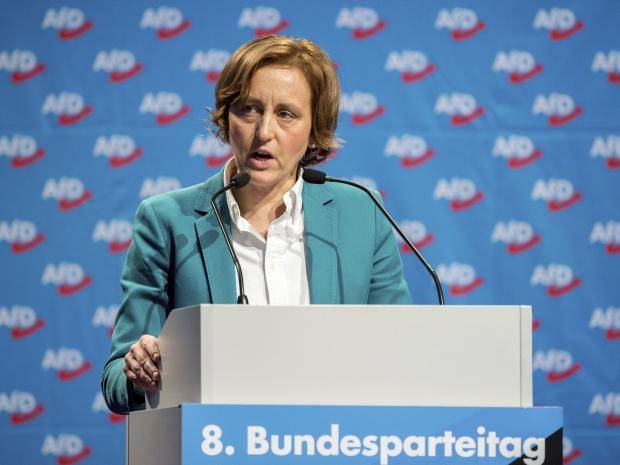German police have asked prosecutors to investigate a prominent member of Germany’s far-right AfD party regarding an anti-Muslim tweet that incites hatred.
Beatrix von Storch, deputy leader of the party’s parliamentary faction, had criticised Cologne police for sending a New Year’s greeting in Arabic on Twitter.
“What the hell is going on with this country? Why is an official police site… tweeting in Arabic?” she wrote. “Did you mean to placate the barbaric, Muslim, gang-raping hordes of men?”
Ms. Von Storch’s tweet appeared to reference chaotic 2015 New Year’s Eve celebrations in Cologne, which were marred by mass sex assaults on women by men of mostly North African origin.
Cologne police told AFP the complaint alleges the tweet flouted anti-incitement laws.
Separately, prosecutors in Cologne said they had received hundreds of complaints over the AfD lawmaker’s comment.
Ms. Von Storch’s account was blocked by Twitter for 12 hours following her post, and the tweet has since been removed.
She posted the same comment on Facebook, which then also took it down, citing “incitement to hate (paragraph 130 of the German penal code)”.
Twitter and Facebook’s tough stance came as an anti-online hate speech law came into effect on January 1 in Germany.
Social media companies that fail to remove illegal inflammatory comments could face up to 50 million euros ($60 million) in fines.
AfD party chief Alexander Gauland took aim at the new rules, saying in remarks carried by national news agency DPA that the regulations are “Stasi methods that remind me of communist East Germany.”
Mr. Gauland, who is not active on social media, encouraged users of such websites to “keep publishing” the erased comments from Ms. Von Storch.
A Cologne police spokesman said it was long-standing practise to send out information in several languages during large gatherings and events.
“We simply want people to be able to understand us,” said the spokesman.
The AfD took 92 parliamentary seats in September elections — the strongest showing for a far-right party in the post-war era — as it capitalised on discontent over the more than one million asylum seekers who have arrived in Germany since 2015.
The refugee issue has again captured public attention over the New Year, with a debate about whether asylum seekers claiming to be minors should submit to medical checks such as hand X-rays to determine their age.
Conservatives, especially from Chancellor Angela Merkel‘s camp, have pushed to standardise the probes after the murder of a 15-year-old girl in the western town of Kandel by her Afghan ex-boyfriend.
The perpetrator claims to be the same age as the victim, but the girl’s father believes him to be significantly older.
Universal medical age checks for refugees “would be an encroachment on welfare,” radiologist and German Medical Association president Frank Ulrich Montgomery told the Sueddeutsche Zeitung newspaper in response to the calls.
“X-raying without any medical indication is interference with people’s bodily integrity.”


